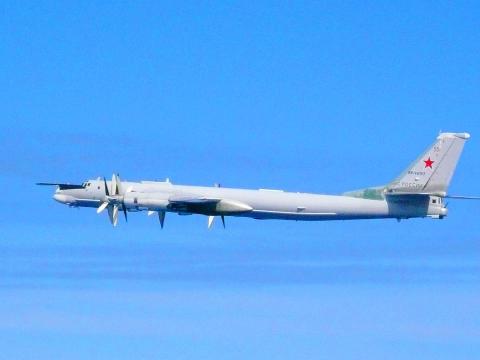South Korean fighter jets yesterday fired hundreds of warning shots and Japan complained to Moscow after a Russian military aircraft entered airspace claimed by both Seoul and Tokyo.
Seoul said three Russian military planes — two Tu-95 bombers and one A-50 airborne early warning and control aircraft — entered South Korea’s air defense identification zone off its east coast before the A-50 intruded in South Korean airspace.
Seoul defense officials said the Russian reconnaissance aircraft left the area three minutes later, but later returned and entered its airspace again for four minutes.

Photo: Reuters / Joint Staff Office of the Japanese Ministry of Defense
The officials said they responded by scrambling F-15K and KF-16 jets, which first issued warnings and fired flares.
They fired 80 warning shots at the plane during the first breach and 280 rounds during the second, a military official said.
At one point, the South Korean and Russian warplanes were just 1km apart, the official added.
“We are assessing this incident in a very grave manner and will take a much tougher measure if it happens again,” National Security Adviser Chung Eui-yong said, according to a presidential Blue House spokeswoman.
Japan complained to both Moscow and Seoul over the incursion.
“We learned that Russian military planes flying over the Sea of Japan this morning twice violated our airspace near Takeshima,” Japanese Chief Cabinet Secretary Yoshihide Suga told a regular press conference.
“Based on this knowledge, we made strong protests,” he said.
Suga, who said Japan also scrambled military jets, added that South Korea’s response was “extremely regrettable.”
However, the Blue House said the disputed islets were an “integral part” of South Korean territory “historically, geographically and under international law.”
Russia denied any breaches, saying that Seoul’s complaint was based on an “arbitrarily established” air defense identification zone that Moscow did not recognize.
“It was not the first time that South Korean pilots tried to unsuccessfully interfere with the flights of the Russian aviation forces above the neutral waters of the Sea of Japan,” the Russian Ministry of Defense said in a statement.
“Such ‘zones’ are recognized by neither international law nor Russia,” it said, adding that Moscow had repeatedly informed Seoul about it.
Russia later released a separate statement, saying Russian and Chinese long-range planes had staged a “first joint patrol mission in the Asia-Pacific region” to “deepen and develop Russian-Chinese relations.”
“Both countries acted in strict accordance with international law,” the ministry said in the statement, adding that the event was “not aimed against third countries.”
Chinese Ministry of Foreign Affairs spokeswoman Hua Chunying (華春瑩) said that South Korea’s air defense identification zone is not a territorial airspace and all countries enjoy freedom of movement there.

BUILDUP: US General Dan Caine said Chinese military maneuvers are not routine exercises, but instead are ‘rehearsals for a forced unification’ with Taiwan China poses an increasingly aggressive threat to the US and deterring Beijing is the Pentagon’s top regional priority amid its rapid military buildup and invasion drills near Taiwan, US Secretary of Defense Pete Hegseth said on Tuesday. “Our pacing threat is communist China,” Hegseth told the US House of Representatives Appropriations Subcommittee on Defense during an oversight hearing with US General Dan Caine, chairman of the Joint Chiefs of Staff. “Beijing is preparing for war in the Indo-Pacific as part of its broader strategy to dominate that region and then the world,” Hegseth said, adding that if it succeeds, it could derail

CHIP WAR: The new restrictions are expected to cut off China’s access to Taiwan’s technologies, materials and equipment essential to building AI semiconductors Taiwan has blacklisted Huawei Technologies Co (華為) and Semiconductor Manufacturing International Corp (SMIC, 中芯), dealing another major blow to the two companies spearheading China’s efforts to develop cutting-edge artificial intelligence (AI) chip technologies. The Ministry of Economic Affairs’ International Trade Administration has included Huawei, SMIC and several of their subsidiaries in an update of its so-called strategic high-tech commodities entity list, the latest version on its Web site showed on Saturday. It did not publicly announce the change. Other entities on the list include organizations such as the Taliban and al-Qaeda, as well as companies in China, Iran and elsewhere. Local companies need

CROSS-STRAIT: The MAC said it barred the Chinese officials from attending an event, because they failed to provide guarantees that Taiwan would be treated with respect The Mainland Affairs Council (MAC) on Friday night defended its decision to bar Chinese officials and tourism representatives from attending a tourism event in Taipei next month, citing the unsafe conditions for Taiwanese in China. The Taipei International Summer Travel Expo, organized by the Taiwan Tourism Exchange Association, is to run from July 18 to 21. China’s Taiwan Affairs Office spokeswoman Zhu Fenglian (朱鳳蓮) on Friday said that representatives from China’s travel industry were excluded from the expo. The Democratic Progressive Party government is obstructing cross-strait tourism exchange in a vain attempt to ignore the mainstream support for peaceful development

ELITE UNIT: President William Lai yesterday praised the National Police Agency’s Special Operations Group after watching it go through assault training and hostage rescue drills The US Navy regularly conducts global war games to develop deterrence strategies against a potential Chinese invasion of Taiwan, aimed at making the nation “a very difficult target to take,” US Acting Chief of Naval Operations James Kilby said on Wednesday. Testifying before the US House of Representatives Armed Services Committee, Kilby said the navy has studied the issue extensively, including routine simulations at the Naval War College. The navy is focused on five key areas: long-range strike capabilities; countering China’s command, control, communications, computers, cyber, intelligence, surveillance, reconnaissance and targeting; terminal ship defense; contested logistics; and nontraditional maritime denial tactics, Kilby